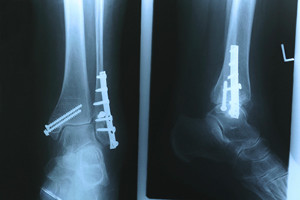Connect With Us
Blog
Items filtered by date: February 2020
Arthritis Can Cause Pain in the Feet and Ankles
Obesity May Cause Foot Conditions to Develop
 The feet and ankles endure increased pressure if one is overweight. This may cause foot conditions to develop that can include different types of arthritis, plantar fasciitis, and flat feet. Additionally, the skin on the feet may be affected, which may cause pain and discomfort. It may be difficult to maintain a good quality of life while there is general foot pain, and it is suggested that a healthy diet is implemented. This can include eating fresh fruits and vegetables, drinking plenty of water daily, and practicing a gentle exercise regime. If you would like more information about how obesity can affect the feet, please consult with a podiatrist.
The feet and ankles endure increased pressure if one is overweight. This may cause foot conditions to develop that can include different types of arthritis, plantar fasciitis, and flat feet. Additionally, the skin on the feet may be affected, which may cause pain and discomfort. It may be difficult to maintain a good quality of life while there is general foot pain, and it is suggested that a healthy diet is implemented. This can include eating fresh fruits and vegetables, drinking plenty of water daily, and practicing a gentle exercise regime. If you would like more information about how obesity can affect the feet, please consult with a podiatrist.
The more you weigh, the harder your feet must work to support your body. If you’re an obese individual and are concerned about your feet, contact Dr. David Ungar from Personal Foot Care. Our doctor can provide the care you need to keep you pain-free and on your feet.
Obesity and Your Feet
People who are overweight are putting more pressure on their ankles, knees, and hips as well as their feet. This unfortunately can lead to variety of different issues.
Problems & Complications Stemming from Obesity
- When the body is overweight, it tries to compensate by changing the way that it moves. An obese person may lean forward and put extra weight on the wrong part of the foot. This puts unnecessary stress on the feet.
- Obese people are also more likely to develop type II diabetes which is a condition that causes a lot of foot problems. People with diabetes often don’t feel the cuts and sores that they may have on their feet, which can lead to more complicated and severe issues.
- Plantar fasciitis is another foot condition that can be caused by obesity. Plantar fasciitis is an inflammation of the tissue along the bottom of the foot, which causes pain and stiffness while walking and climbing stairs.
If you have any questions, please feel free to contact our office located in Farmington, MI . We offer the newest diagnostic and treatment technologies for all your foot care needs.
Warming up Before and After Running
 People who enjoy the sport of running are most likely familiar with the importance of properly warming up before and after each run. The ankles may become more stable when leg swings are practiced frequently, followed by performing hip circles. Research has indicated that running injuries may be prevented when you focus on a specific type of running, and train accordingly. These can consist of increasing speed, endurance, or running up and down hills. Practicing squats is an effective way of increasing the range of motion in your ankles, hips, and knees. If you would like additional information about how running injuries can affect the feet and how to prevent them, please consult with a podiatrist.
People who enjoy the sport of running are most likely familiar with the importance of properly warming up before and after each run. The ankles may become more stable when leg swings are practiced frequently, followed by performing hip circles. Research has indicated that running injuries may be prevented when you focus on a specific type of running, and train accordingly. These can consist of increasing speed, endurance, or running up and down hills. Practicing squats is an effective way of increasing the range of motion in your ankles, hips, and knees. If you would like additional information about how running injuries can affect the feet and how to prevent them, please consult with a podiatrist.
All runners should take extra precaution when trying to avoid injury. If you have any concerns about your feet, contact Dr. David Ungar of Personal Foot Care. Our doctor will treat your foot and ankle needs.
How to Prevent Running Injuries
There are a lot of mistakes a runner can make prior to a workout that can induce injury. A lot of athletes tend to overstretch before running, instead of saving those workouts for a post-run routine. Deep lunges and hand-to-toe hamstring pulls should be performed after a workout instead of during a warmup. Another common mistake is jumping into an intense routine before your body is physically prepared for it. You should try to ease your way into long-distance running instead of forcing yourself to rush into it.
More Tips for Preventing Injury
- Incorporate Strength Training into Workouts - This will help improve the body’s overall athleticism
- Improve and Maintain Your Flexibility – Stretching everyday will help improve overall performance
- “Warm Up” Before Running and “Cool Down” Afterward – A warm up of 5-10 minutes helps get rid of lactic acid in the muscles and prevents delayed muscle soreness
- Cross-Training is Crucial
- Wear Proper Running Shoes
- Have a Formal Gait Analysis – Poor biomechanics can easily cause injury
If you have any questions, please feel free to contact our office located in Farmington, MI . We offer the newest diagnostic and treatment technologies for all your foot care needs.
Do I Have a Stress Fracture?
 A hairline fracture that gradually occurs may be defined as a stress fracture. It can happen as a result of frequently running or participating in sporting activities, and is known to develop from overuse. If a stress fracture is not promptly treated, it will typically get worse as the activity continues. The common symptoms that are associated with this condition may include swelling, pain and discomfort surrounding the affected area, and it may be difficult to walk. Factors that may lead to the development of a stress fracture can consist of wearing shoes that do not fit correctly, running on hard or uneven surfaces, or existing medical conditions such as osteoporosis. Relief may be obtained by elevating the affected foot, as this may help to reduce swelling. If you have endured a stress fracture it is suggested that you schedule a consultation with a podiatrist as quickly as possible, so proper treatment can begin.
A hairline fracture that gradually occurs may be defined as a stress fracture. It can happen as a result of frequently running or participating in sporting activities, and is known to develop from overuse. If a stress fracture is not promptly treated, it will typically get worse as the activity continues. The common symptoms that are associated with this condition may include swelling, pain and discomfort surrounding the affected area, and it may be difficult to walk. Factors that may lead to the development of a stress fracture can consist of wearing shoes that do not fit correctly, running on hard or uneven surfaces, or existing medical conditions such as osteoporosis. Relief may be obtained by elevating the affected foot, as this may help to reduce swelling. If you have endured a stress fracture it is suggested that you schedule a consultation with a podiatrist as quickly as possible, so proper treatment can begin.
Activities where too much pressure is put on the feet can cause stress fractures. To learn more, contact Dr. David Ungar from Personal Foot Care. Our doctor can provide the care you need to keep your pain free and on your feet.
Dealing with Stress Fractures of the Foot and Ankle
Stress fractures occur in the foot and ankle when muscles in these areas weaken from too much or too little use. The feet and ankles then lose support when walking or running from the impact of the ground. Since there is no protection, the bones receive the full impact of each step. Stress on the feet can cause cracks to form in the bones, thus creating stress fractures.
What Are Stress Fractures?
Stress fractures occur frequently in individuals whose daily activities cause great impact on the feet and ankles. Stress factors are most common among:
- Runners
- People affected with Osteoporosis
- Tennis or basketball players
- Gymnasts
- High impact workouts
Symptoms
Pain from the fractures occur in the area of the fractures and can be constant or intermittent. It will often cause sharp or dull pain with swelling and tenderness. Engaging in any kind of activity which involves high impact will aggravate pain.
If you have any questions please contact our office located in Farmington, MI . We offer the newest diagnostic and treatment technologies for all your foot and ankle needs.
Possible Foot Conditions Affecting Diabetic Patients
Research has indicated that there are two ailments that may develop as a result of being diabetic.These conditions are known as peripheral artery disease (PAD), and peripheral neuropathy. Both of these can accelerate the risk of foot problems in diabetic patients as a result of potential nerve damage. Additional foot problems that can happen from being diabetic can include fungal infections, ingrown toenails, or bunions. Diabetes can occur if the glucose levels in the blood become elevated, and can possibly be controlled when foods that are eaten contain minimal sugar. If you are a diabetic patient, it is strongly advised that you are under the care of a podiatrist who can help you to manage this potentially dangerous condition.
Diabetic foot care is important in preventing foot ailments such as ulcers. If you are suffering from diabetes or have any other concerns about your feet, contact Dr. David Ungar from Personal Foot Care. Our doctor can provide the care you need to keep you pain-free and on your feet.
Diabetic Foot Care
Diabetes affects millions of people every year. The condition can damage blood vessels in many parts of the body, especially the feet. Because of this, taking care of your feet is essential if you have diabetes, and having a podiatrist help monitor your foot health is highly recommended.
The Importance of Caring for Your Feet
- Routinely inspect your feet for bruises or sores.
- Wear socks that fit your feet comfortably.
- Wear comfortable shoes that provide adequate support.
Patients with diabetes should have their doctor monitor their blood levels, as blood sugar levels play such a huge role in diabetic care. Monitoring these levels on a regular basis is highly advised.
It is always best to inform your healthcare professional of any concerns you may have regarding your feet, especially for diabetic patients. Early treatment and routine foot examinations are keys to maintaining proper health, especially because severe complications can arise if proper treatment is not applied.
If you have any questions, please feel free to contact our office located in Farmington, MI . We offer the newest diagnostic and treatment technologies for all your foot care needs.



